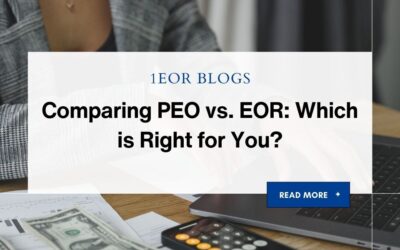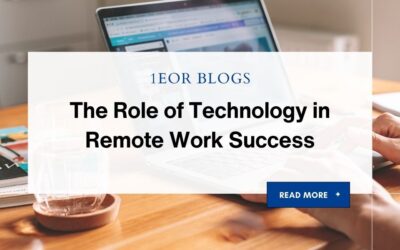In today’s globalized business landscape, expanding your company into new markets is an exciting opportunity that comes with its fair share of challenges. One of the most critical decisions you’ll make during this process is selecting the right Employer of Record (EOR) to support your international growth. An EOR is a third-party organization that serves as the legal employer for your overseas workers, handling payroll, benefits, compliance, and other HR functions on your behalf. By partnering with the right EOR, you can streamline your expansion, mitigate risks, and focus on your core business objectives. However, with so many EOR providers in the market, choosing the best fit for your company can be daunting. In this comprehensive guide, we’ll walk you through the key factors to consider when selecting an EOR, ensuring a smooth and successful global expansion.
Define Your Expansion Goals and Requirements
Before you begin your search for an EOR, it’s essential to clearly define your expansion goals and the specific requirements you have for your international workforce. Ask yourself questions like:
- What are your primary reasons for expanding into new markets (e.g., accessing new talent pools, tapping into growing markets, reducing costs)?
- How many employees do you plan to hire in each target country, and what types of roles will they fill?
- What level of support do you need from an EOR in terms of payroll, benefits, compliance, and HR services?
- Are there any specific countries or regions you plan to expand into, and what are the unique challenges associated with those markets?
By answering these questions, you’ll gain a better understanding of your needs and can use that information to evaluate potential EOR partners. It’s also helpful to prioritize your requirements, as this will guide you in selecting an EOR that can best meet your most critical needs.
Assess the EOR’s Global Presence and Expertise
One of the most important factors to consider when choosing an EOR is the provider’s global presence and expertise. Look for an EOR that has a strong track record of successfully supporting companies in your target markets and industries. Some key things to assess include:
- The EOR’s geographic footprint and the specific countries where they have a presence and local expertise
- Their experience working with companies in your industry and the types of roles they’ve supported
- The size and scope of their client base, as well as the types of companies they typically work with (e.g., startups, SMBs, enterprises)
- The qualifications and expertise of their in-country HR and compliance teams
- Client references and case studies demonstrating successful global expansions
An EOR with a broad global reach and deep local knowledge in your target markets will be better equipped to navigate the complexities of international employment and ensure compliance with local labor laws and regulations.
Evaluate the EOR’s Service Offerings
Another critical consideration is the range and quality of services the EOR provides. Look for an EOR that offers a comprehensive suite of services tailored to your specific needs. At a minimum, your EOR should handle the following core functions:
- Payroll processing and tax withholding
- Benefits administration and enrollment
- Employment contract creation and management
- Compliance with local labor laws and regulations
- HR support and employee relations
- Termination and offboarding processes
Many EORs also offer additional services like visa and immigration support, employee relocation assistance, and global mobility programs. Consider which of these services are most important for your expansion plans and look for an EOR that can provide them seamlessly.
Assess the EOR’s Technology and Integration Capabilities
In today’s digital age, the technology an EOR uses to manage international employment is just as important as the services they provide. Look for an EOR that utilizes cutting-edge HR and payroll software that is secure, user-friendly, and easily integrates with your existing systems. Some key features to look for include:
- Cloud-based platforms accessible from anywhere
- Robust data security and privacy measures
- Seamless integration with popular accounting, HRIS, and payroll software
- Real-time reporting and analytics capabilities
- Self-service portals for employees to access pay stubs, tax forms, and other HR documents
An EOR with modern, well-integrated technology will help streamline your global employment processes, reduce administrative overhead, and provide better visibility into your international workforce.
Consider the EOR’s Pricing and Contractual Terms
Cost is always a consideration when selecting any service provider, and EORs are no exception. Look for an EOR that offers transparent, predictable pricing based on your specific needs. Many EORs charge a flat monthly fee per employee, while others use a percentage of payroll. Be wary of EORs with hidden fees or complex pricing structures that make it difficult to budget accurately.
In addition to pricing, carefully review the EOR’s contractual terms and conditions. Look for an EOR that offers flexible, scalable contracts that can adapt to your changing needs as your business grows. Key terms to consider include:
- Contract duration and renewal options
- Termination clauses and exit procedures
- Dispute resolution processes
- Liability and indemnification provisions
- Data privacy and security commitments
An EOR with transparent pricing and flexible, fair contractual terms will provide the financial predictability and legal protection you need to confidently expand your business globally.
Prioritize Client References and Reviews
When evaluating potential EOR partners, don’t underestimate the value of client references and reviews. Reach out to current and former clients of the EOR to get firsthand insights into their experience working with the provider. Some key questions to ask include:
- How would you rate the EOR’s overall service quality and responsiveness?
- Did the EOR deliver on their promises and meet your expectations?
- How well did the EOR handle challenges or issues that arose during the engagement?
- Would you recommend the EOR to other companies looking to expand globally?
In addition to direct references, look for online reviews and case studies that showcase the EOR’s track record of success. Pay attention to the types of companies they work with and the specific challenges they helped those clients overcome.
Ensure the EOR’s Scalability and Commitment to Partnership
As your business grows and evolves, your EOR partner should be able to scale with you and adapt to your changing needs. Look for an EOR that has a proven track record of supporting companies through rapid growth and expansion. Some key signs of scalability include:
- A robust global infrastructure that can accommodate large-scale hiring
- Flexible service offerings that can be easily added or modified as needed
- A commitment to continuous improvement and innovation
- A collaborative, consultative approach to client relationships
The ideal EOR partner should view your engagement as a long-term strategic partnership, not just a transactional relationship. They should be proactive in identifying opportunities to optimize your global employment processes, reduce costs, and drive better business outcomes.
Prioritize Cultural Fit and Values Alignment
Finally, don’t overlook the importance of cultural fit and values alignment when selecting an EOR partner. Your EOR should share your company’s core values and commitment to excellence, integrity, and employee well-being. Look for an EOR that:
- Prioritizes transparency, communication, and responsiveness in their client relationships
- Demonstrates a strong ethical code and commitment to compliance
- Fosters a positive, supportive work culture for their own employees
- Aligns with your company’s diversity, equity, and inclusion initiatives
- Shares your vision for the future of work and global employment
A culturally compatible EOR partner will be better equipped to serve as an extension of your own HR team and ensure a seamless, positive experience for your international employees.
In conclusion, choosing the right EOR is a critical decision that can make or break your global expansion plans. By carefully evaluating potential partners based on their global presence, service offerings, technology capabilities, pricing, references, scalability, and cultural fit, you can find an EOR that will be a true strategic ally in your international growth journey. Take the time to do your due diligence, ask the right questions, and trust your instincts to select an EOR that will help you navigate the complexities of global employment with confidence and ease.



